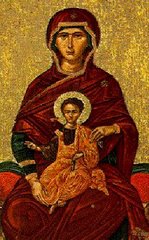I.Nature
The term itself gives us some insight, for Ecclesiology is based on the Greek word for church, "ekklesia". An ekklesia is an assembly, a term quite fitting for the Church because it contains the basic elements required of any assembly. We'll look at a typical assembly at CRHS first to draw out those elements.

1. There are people - students and teachers, usually gathered in the Gym.
2. We are called to the Gym, usually over the P.A. system
3. Our call to the gym has a source, usually Mrs. Hoy or Mr. Hunt.
So the basic elements of an assembly are:
1. People
2. A calling
3. A person who does the calling (God).
In other words, the Church is "People called by God" and in this sense is an Assembly, an ekklesia.
II. Mission
Q. Why is the Church called? What is it called to do?
A. To bring about the Kingdom of God!
Q. What is the Kingdom of God?
A. It is not, as one might think, simply Heaven. Nor is it some worldly kingdom with a great castle. A Kingdom is where the king's will is supreme - over all else. Therefore, the Kingdom of God is where God's will is supreme; where people consistently place the will of God over the will of man.
III. Method - How does the Church bring about the Kingdom of God?
All of the actions of the Church can be categorized into one of three groups:
1. Preaching
2. Prayer
3. Service
Why these three? They correspond to the three-part nature of Christ (the Messiah or Anointed one) and therefore to the three-part nature of the Christian (who is called to be Christ-like).
1. Prophet - one who preaches the Word of God. Preaching does not have to be from a pulpit on Sunday morning. St. Francis of Assisi said we should, "Preach always. Use words when necessary." We know that actions speak louder than words, so our actions are doing are preaching for us. What kind of sermon are you preaching with your life?
2. Priest - the priests of Israel offered prayer and sacrifice of animals or crops. As Christians we are part of the Priesthood of All Believers and we are all called to offer prayers to God and spiritual sacrifices in our lives.
3. King - as king, David acknowledged that his rule was for the good of his people and that he was to remain a servant of God. "David knew the Lord had established him as King of Israel and had exalted his rule for the sake of his people Israel." (2 Samuel 5:12) Likewise, as a royal people, Christians are called to be of service to God an others.
IV. Organization
St. Paul writes that the Church, like a body, is one though it is made up of many parts. (See 1 Corinthians 12:12 ff.) There are many different roles to be filled in the Church. Some are ordained to their roles, others enter into them through a sacramental bond or by publicly professing vows.
A. Bishops- the twelve Apostles were chosen by Christ to spread the faith (evangelization) and to oversee the Church as administrators. They appointed others to fulfill this same role in different regions and to continue in this role after their death. The word bishop (episcopus in Greek) means "overseer".
B. Priests - as Christianity grew the Bishops were unable to be tend to the needs of all Christians within their regions. They appointed elders (in Greek, presbyters) to serve as their representatives to local church communities. Priests continue this function today and are sometimes called "vicars" because they are representatives of the bishop.
C. Deacons - we read in the Acts of the Apostles that tending to the needs of the poor was a concern even in the early church. In Chapter 6 we see the Apostles respond to the need for more help when they ordain seven men who were reputable, filled with the Holy Spirit and wisdom, to be their assistants. The Greek word for assistant is diakonos, which is the origin of the word "deacon."
D. Laity - this is pretty much most of us. We are not part of sacred orders, but nonetheless we share in the Universal Call to Holiness and we are pursue that call through marriage and daily family life or the vocation to single life.
E. Religious Life - these are people who live according to a "Rule" of life (religio - is the Latin for rule). This includes Benedictines, Franciscans, Dominicans, and all other groups of monks, friars, and nuns. They are not, by definition, ordained, though many monks and friars are eventually ordained.
Did we leave anyone out? Well, you could say the Pope gets his own cagegory, since he is the succesor to St. Peter. He is considered the "first among equals", the leader of all the bishops. And what about those Cardinals? well, they are advisors to the Pope. Most, but not all, are bishops.
Next we will move on to how the Church calls us to work for Justice.
Ad Jesum per Mariam.
Mr. B

No comments:
Post a Comment